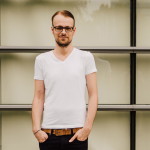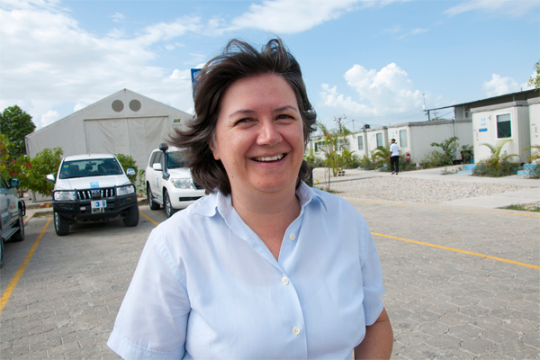In Conversation: Interview with Jessica Faieta, UNDP director for Latin America and the Caribbean
Name: Jessica Faieta
Born: Quito, Ecuador, 1964.
Education: High school in Ecuador, New York State University, Colombia University, Yale University.
Work: Worked with UNDP in eight countries in Latin American and the Caribbean.
Media:New York Times, The Economist, CNN en Español every day.
Last film: Captain America.
Last books read: Music theory for computer musicians by Michael Hewitt. Last night a DJ changed my life by Bill Brewster. Middlesex by Jeffrey Eugenides.
What’s the first thing that comes to mind when you think of a UN official? You probably think of a dry, button-down, white-haired guy in his 60s. Jessica Faieta, the newly-appointed UN Development Programme (UNDP) director for Latin America and the Caribbean, shatters that assumption. She’s passionate, upbeat and even DJs in her spare time. Last month, the Herald spoke with Jessica about the UNDP’s work in Latin America, why inequalities aren’t just to do with income and how she used to wander around outside the UN’s New York offices as a student…
– – –
I understand you’ve worked all over the region, including Argentina.
I have actually worked, and lived, with the UNDP in eight countries in the region, so I’m very familiar with the region.
And what are some of your highlights?
I have experience recently of Haiti, I was there during the UNDP reconstruction efforts after the earthquake (in 2010), so that’s certainly something I keep close to my heart, as hard as it was. I’ve also worked in fascinating countries like Cuba, at the time Pope John Paul II arrived; I was in Panama during the handover of the canal; in Buenos Aires I was there in difficult times as well, during the crisis of 2001 to 2002. I started my career in Guyana… I believe that because of what I learned there, that’s why I am what I am right now.
And how did you end up working for the UN?
I studied in the United States. I did my high school (years) in Ecuador, but I went to university in the United States. First at the State University of New York. I had this interest in working in… I don’t know if it was development at the time, I didn’t know what my calling was, but I was fascinated by the work of the UN — the values, the principles — but I didn’t know too much about it.
So when I was studying here in New York, I used to come around the UN and wander in front of the building… literally, in front of the very big building, thinking ‘So how does someone work for the UN?’ — I’d watch them come out of the building. So then I researched a bit, and I entered through the formal recruitment process for the UNDP. But first I became a UN volunteer in Guyana, and that was my first experience.
And how did you end up in Guyana?
It was actually the UN that sent me there, but my first interest was to work for the UN in whatever form! I was rather young at the time.
I didn’t actually know much about Guyana, I was in Ecuador at the time — no Internet, no Google or anything (laughs) — it was for me a surprise, (in 1991) to see a country that was in the region but with so many challenges, but it was my experience — that’s what formed my conviction… I’m very grateful they sent me.
It’s interesting that you work for the development programme. The UNDP seems like a more hands-on role in trying to affect change.
I actually started my career in economics, that’s my bachelor’s degree… when I was working in my own country, after having just finished studying, my first job — it wasn’t a job as such, an internship, it was with an international bank. When I left my country, I found myself (in Guyana) and I thought, ‘Yes, it’s actually helping the people.’ In a way, it was yes, a social calling, but I must admit it was not early on in my academic career, it came with my first experience. That was 23 years ago.
“When I was studying here in New York, I used to come around the UN and wander, literally, in front of the very big building, thinking ‘So how does someone work for the UN?’”
The UNDP website says you are in charge of 892 people in 42 countries?
We normally round up to about 1,000, it depends on how you count them. We have 26 offices, plus the regional service centre. We have residents and programmes in 33 countries.
About some of the challenges that LatAm faces: is it fair to say that you think inequality is the biggest problem facing the region?
It’s certainly one of the biggest challenges that we have. We are considered one of the most unequal regions in the world. However, when we measure inequality, it’s not only income inequality — for us, inequality means between men and women when it comes to access to jobs, when it comes to salaries; inequality within countries, between urban and rural areas when it comes to access to services. Inequalities in terms of representation, in terms of populations, not just for women but for youths, for indigenous groups, in political participation. It’s not only about income inequalities, it’s about their access to services, to political representation, their voice — that’s really why we call ourselves the most unequal region in the world.
What’s the UNDP’s main aim, the biggest objective, on the continent?
For us, if we want to use one single word to define the work of the UNDP in Latin America and the Caribbean, it’s inequality. But then, as we go a little deeper, poverty is certainly an issue. You see for example in the region, that growth is no longer enough to address this.
We have to work on fiscal policies, addressing the aspects of poverty, social protection policies… citizen insecurity is one of the biggest concerns in the region. We do tackle them from different angles — the participation of women in decision-making in politics, the indigenous populations…
Just to pull back on youth for a minute. If the role is to engage them in politics — what we’ve seen of late is maybe a different role, in public protests, in Chile, in Brazil…
Addressing the issues of the youth is a centrepiece of our strategy. Of the 600 million inhabitants in Latin America, about 26 percent of them are between the ages of 15 and 29, so that’s a very large amount.
Of those, there are a large number who are not either studying or working — so it is difficult to address, as for instance, they’re not subject to social policies, because they’re not employed, they’re not in the schemes… sometimes it’s even hard to find out statistically where they are. But we see very much youth as an agent of change, and we are seeing them now expressing their voice and in this case, the voice of discontent. But also demanding more, demanding more from their governments.
“It’s not only about income inequalities, it’s about their access to services, to political representation, their voice — that’s really why we call ourselves the most unequal region in the world.”
What are the UNDP’s aims for LatAm?
The key lesson of this decade is that hard inequalities, exclusion and discrimination do not go away with more economic growth. Our goal is to help countries move beyond growth to enhance citizen wellbeing in the region, pursuing a more balanced development path.
Are there are governments that are more welcoming of the UNDP’s work than others?
Your question is: is there some countries where it’s easier for us to work than others?
Well, are there some that are more welcoming of the work of the UNDP than others?
Look, because our work is very much a partnership with the government, what we do, in a way, is we agree with the governments. We have a standing partnership with the governments that we will help them if they are not doing something well and need to do it better. And I think our role and the roles of our resident coordinators, most of our offices, the people are nationals of the country, so they know the realities and understand the way we can work.. so I would not say in any particular areas there are difficulties for us to work, but certainly it’s something we need to agree with each government.
I wanted to just ask about your time in Argentina. Obviously it was a very interesting time…
I was the deputy resident representative of the UNDP in Argentina. I arrived in 2001, right after 9/11 in New York. I arrived in October, which coincided with the very difficult economic, social and political period as you can remember.
The most salient part of our work was to jointly initiate with the Church, the Catholic Church actually, the diálogo argentino. At the time it served to bring some pressure to really create dialogue in some areas where there was a complete breakdown…
I learnt a lot, it was difficult for our staff and for the population, but at the same time I think it was an important role that we played at the time. And I feel very privileged to have been part of that.
@urlgoeshere
Originally published in the Buenos Aires Herald, on Thursday, July 17, 2014
Link: http://www.buenosairesherald.com/article/164785/jessica-faieta-undp-director-for-latin-america-and-the-caribbean.



